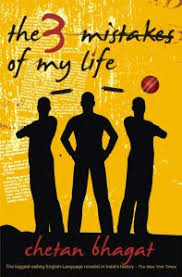
Availability
available
Original Title
The 3 Mistakes of My Life
Subject & College
Publish Date
2008-01-01
Published Year
2008
Publisher, Place
ISBN
978-81-291-1372-6
Format
Paperback
Country
India
Language
English
Average Ratings
Readers Feedback
The 3 Mistakes of My Life
Review By Prof. Ganesh Katariya, Asst. Professor, Baburaoji Gholap College, Pune The Three Mistakes of My Life by Chetan Bhagat is a fast-paced, emotionally engaging...Read More
Prof. Ganesh Katariya
The 3 Mistakes of My Life
Review By Prof. Ganesh Katariya, Asst. Professor, Baburaoji Gholap College, Pune
The Three Mistakes of My Life by Chetan Bhagat is a fast-paced, emotionally engaging novel about a young man, Govind, reflecting on the mistakes he believes shaped his life. The story explores friendship, love, ambition, and the challenges of modern India, with themes of religion, business, and personal growth. While the simple language and predictable plot may appeal to a wide audience, some may find the characters and their development lacking depth. It’s a quick, relatable read for those seeking a light, thought-provoking story.
It’s the story about three friends Omi, Govind, and Ish. The story is presented through Govind’s eyes, and it’s his three mistakes of life presented along. Govind is a true Gujarati, interested in coming up on his own in life, through business. Ish is an avid cricket player whose passion lies in playing, teaching, and watching cricket. Omi is a priest’s son who doesn’t have any ambition and moves along with his two friends. These simple people’s journey in life, how their lives get affected by the worst disasters in Gujarat’s history is portrayed in a simple yet efficient way by Chetan. This book also teaches you how your dreams crash into pieces by unexpected events but how you get back on track, focus, and rebuild your dreams with support from people around you.
While reading this book it reminds me of something which my world’s best friend said to me once, well he is my dad. He said to me that friendship is not what people think of, it’s a bond between two faces which are different from each other maybe the magnetic pole. Where we learn how to make ourselves become neutral and share a common ground of relationship with the person. You may not like or love them, but you can still tolerate them because it’s the one thing you want to protect.
